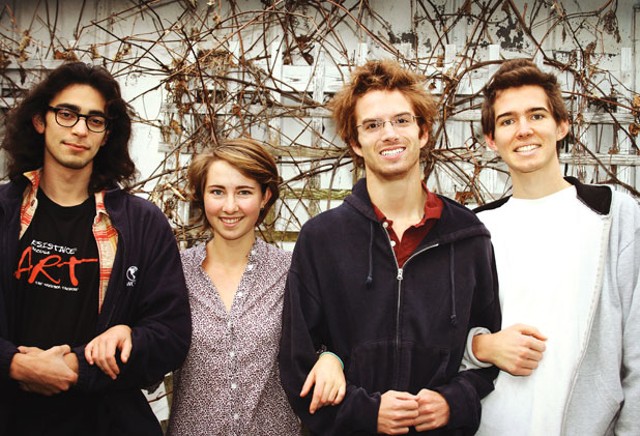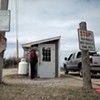Published November 7, 2012 at 2:37 p.m.
At Middlebury College, satirists pay a price.
That’s what five students learned after distributing a fake press release last month claiming that, in honor of the Dalai Lama’s visit, the college was divesting from companies that support war or environmental destruction.
The press release was a hoax meant to draw attention to what students see as the college’s hypocrisy in publicly touting values of sustainability while privately investing in companies the students suspect are socially irresponsible.
But Middlebury’s response was dead serious: It put the pranksters on trial for violating school policy in the first public judicial hearing on campus in more than five years.
The five students on trial — Molly Stuart, Jay Saper, Sam Koplinka-Loehr, Amitai Ben-Abba and Jenny Marks — nabbed statewide media attention last month after they outed themselves as the masterminds behind the prank. But just days after they came clean, they learned that the college was investigating their action for potential violations of college policy — charges punishable by suspension or even expulsion.
The judicial board found the students guilty of violating community standards of integrity and honesty, as well as the ethical and law-abiding behavior clause in the Middlebury handbook.
“I think the action pointed out the contradiction between what we believe in and where we get our money,” says Laurie Essig, a professor of sociology and anthropology at the college. She likens it to the social commentary on the “The Daily Show” or “The Colbert Report” — or in the political theater of groups such as the Yes Men.
“A lot of activism and social commentary happens on that line between hypocrisy and possibility,” she says.
Middlebury earns a “C” for endowment transparency from the College Sustainability Report Card. And because the private college doesn’t disclose where that money is invested, the student activists were working on the assumption that some of the funds are tied up in companies that support war, arms manufacturing or environmental destruction.
Is it a reasonable assumption? College officials won’t discuss the investments — or the disciplinary hearing.
An official statement from Dean Shirley Collado said the hearing proceeded “in an appropriate manner,” that the college “respects the judicial board’s decision” and that neither Collado nor others at the college will comment further on the outcome of the hearing, which was an unofficial reprimand — a slap on the wrist.
Pressed for specifics about the endowment — whether the college invests in arms manufacturers or fossil-fuel companies — Director of Public Affairs Sarah Ray declined to comment beyond Collado’s statement, which did not address the issue. Patrick Norton, the college’s treasurer and vice president for finance, was unavailable for an interview last week to discuss divestment.
But Essig says it’s not beyond the realm of possibility that Middlebury’s $881 million endowment would be at least partially invested in “big oil” and “big military.” She thinks it’s reasonable to assume that most pensions and endowments — unless they’re explicitly screening for socially responsible companies — have some money in those interests.
“If there’s nothing to hide, great,” said Koplinka-Loehr — but he’s skeptical.
It’s hard to know exactly what happened during last week’s judicial hearing. Campus security officers hovered outside the auditorium checking IDs, only allowing students, faculty and staff members into Dana Auditorium. The 272-seat auditorium — the largest on campus — was filled to capacity before the hearing even started.
The students on trial say they only had brief access to the evidence the college presented against them. They also weren’t allowed access to legal advice or representation during the hearing. Each had a faculty advisor, who could pass notes to the students during the hearing and counsel them during breaks.
Saper says the students also consulted with the American Civil Liberties Union of Vermont and Vermont Law School faculty. They learned their press release constituted “protected speech” under the Constitution — but not necessarily at Middlebury, where the students are subject to the rules and guidelines of the college handbook. New accusations were leveled fewer than 24 hours before the hearing, according to the students, while the powers that be rejected their evidence and witnesses.
“We found ourselves a day before the hearing feeling that the game was completely rigged,” says Ben-Abba.
On the steps outside the auditorium, student Anna Shireman-Grabowski — wearing a nose ring and red sweater — offered red-cloth armbands to students as they streamed inside. The students on trial had asked friends and supporters to show up wearing red as a sign of solidarity. Fifteen minutes before the hearing started, Shireman-Grabowski was out of armbands. So she offered a faded red flannel shirt to a passerby.
Shireman-Grabowski called the Dalai Lama prank “a brilliant move” and said she was skeptical about the motivations for the hearing. “There have been comparable violations that haven’t been prosecuted in a similar way because they weren’t political,” she said.
Students who came outside during the hearing said the atmosphere inside was “intense.” But exactly what transpired during the hearing — which stretched on for 10 hours — isn’t exactly clear. According to onlookers, subsequent interviews with the students on trial and coverage by the student-run Midd Blog, the hearing hinged on a few key questions. First: Was the fake email satire, as the students contended, or deception? Second: In signing the fake press release with a made-up name, did the students violate Middlebury College handbook policies of honesty and accountability? Finally: How much of a nuisance did the fake press release cause?
It certainly fooled some recipients — including David Stoll, an anthropology professor at Middlebury who showed up a few minutes too late to catch the start of last week’s hearing. Standing outside of the auditorium, he recalled taking the press release “at face value” on first read and feeling delighted.
“I do support the idea of divestment as a consciousness-raising device,” says Stoll.
But the questions before the judicial board had less to do with the students’ message and more to do with execution. Middlebury sophomore Fernando Sandoval said he strongly supports divestment, and enthusiastically talked up environmentalist and Middlebury professor Bill McKibben’s new campaign to persuade schools, churches and other foundations to divest their endowments from the oil, gas and coal industries. He credits the press release and McKibben’s campaign with spurring him to look more seriously at the issue.
“I knew that Middlebury’s endowment wasn’t completely socially responsible, but I didn’t know exactly what that meant,” he says. Now he looks at divestment as potentially one of the most powerful tools in the fight against fossil-fuel companies. “If almost $900 million don’t have an impact, then what will?”
But even Sandoval says he didn’t fully support the methods the students used. He worried that their approach risked alienating students and faculty rather than encouraging them. “It sounded too radical,” he said.
Koplinka-Loehr admitted, “A lot of people were uncomfortable with our activism, and denounced it, or struggled with that concept of: Is there a ‘good’ and ‘bad’ activism? I think that’s been a powerful discussion to engage in, in that we do have a very complacent campus.”
Now with the hearing concluded, and the threat of suspension off the table, the student activists say it’s time to focus on making the prospect of divestment a reality. They argue there’s precedent for it. The college joined dozens of institutions in the 1980s in divesting from South African corporations in protest against apartheid. More recently, Hampshire College unveiled last month that its endowment is currently free of fossil-fuel companies.
Divestment is fast becoming a tactic used by student activists fighting against climate change. Students at the University of Vermont last month called on the board of trustees to pull endowment funds from oil and energy stocks. Also in late October, students at 18 colleges and universities staged a National Day of Action to pressure their administrations to divest; the campaign involved some big-name institutions, including Cornell, Boston University and Harvard.
At Middlebury, it’s an idea that’s been simmering for years, but the Dalai Lama Five say they were impatient with the lack of progress. The ultimate goal, they say, is to put the college’s money where its mouth is.
“Can five students do that? No,” says Koplinka-Loehr. “It is the fact that our student body cares about this message, and cares about it more than ever, that will actually make it happen.”
Indeed, late last week, Norton, the college treasurer, emailed the college community advertising new open office hours to discuss college finances. Students are no longer hammering on closed doors, says Ben-Abba, begging for college officials to listen. And they take some pleasure in the fact that one recurring message seemed to crop up at their hearing.
“Now everyone seems to be saying that our method was wrong, but the message of divestment — ‘we totally believe in that,’” Ben-Abba says. And that, he says, is a
More By This Author
Speaking of...
-

Middlebury: What to See, Do and Eat During the Eclipse
Mar 6, 2024 -

In Terms of Registering to Vote, Midd Kids Are Top of the Classes
Feb 28, 2024 -

19th-Century Educator Alexander Twilight Broke Racial Barriers, but Only Long After His Death. It’s Complicated.
Sep 20, 2023 -

Ninth Annual Middlebury New Filmmakers Festival Features Themes of Perseverance
Aug 16, 2023 -

Formerly Incarcerated Women to Find Work and Housing Through a New Program
Mar 8, 2023 - More »
Comments
Comments are closed.
From 2014-2020, Seven Days allowed readers to comment on all stories posted on our website. While we've appreciated the suggestions and insights, right now Seven Days is prioritizing our core mission — producing high-quality, responsible local journalism — over moderating online debates between readers.
To criticize, correct or praise our reporting, please send us a letter to the editor or send us a tip. We’ll check it out and report the results.
Online comments may return when we have better tech tools for managing them. Thanks for reading.















































